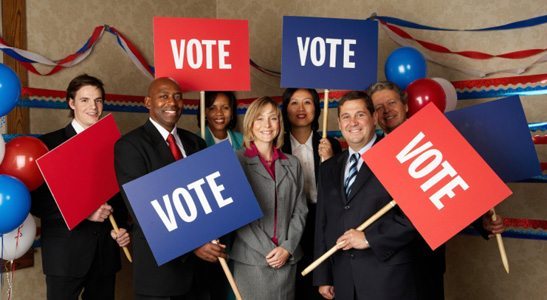Despite record-setting numbers in the November midterm election, turnout will likely remain a problem in Arizona, policy experts said Monday. But they expect a trend toward split-ticket voting, where people choose by candidate rather than party, to continue.
Arizona saw its highest voter turnout in a midterm election since 1982, but about half of people who were eligible to vote did so, according to Joseph Garcia of the Morrison Institute for Public Policy at Arizona State University.
“If half of our fellow Americans are not voting, that’s hardly a reason to celebrate a representative democracy,” said Garcia, speaking at the institute’s State of the State conference, which focused on voter turnout.
Nearly 2.4 million people – more than 64 percent of Arizona’s registered voters – voted in the Arizona midterm election, according to the Arizona Secretary of State’s Office. But millions more who were eligible as U.S. citizens either registered to vote but didn’t cast a ballot or didn’t bother to register at all, he said.
Arizona’s Voter Crisis, a report published by the Morrison Institute and the Citizens Clean Elections Commission, said Arizona ranked 43rd in voter turnout over the previous four presidential elections.
“Our elected officials yield great power that is disproportionate to their overall voter endorsement,” the report reads.
States who allow voters to register on Election Day ranked highest in 2016 voter turnout, Garcia said. Arizona requires voters to register at least four weeks before the general election.
Despite the trend, it is unlikely Arizona will change its voter registration process any time soon, said Neil Giuliano, president and CEO of Greater Phoenix Leadership.
“Being politically realistic,” Giuliano said, “voter registration reform issues don’t happen very often in red states.”
Election experts did see what they called a positive trend towards split-ticket voting, where people choose candidates for various public offices from the Republican or Democratic party rather than voting by party affiliation.
“It looks like a lot of people chose candidates over teams,” ASU President Michael Crow said in opening remarks. “The state of this state, Arizona, is somewhere between very good and excellent.”
Panelists at the conference said voters are typically less likely to vote across party lines for offices like governor and Senate. However, midterm results indicated Arizonans were willing to vote across party lines, electing a Republican governor and a Democratic senator, among others.
Garrett Archer, senior analyst for elections at the Secretary of State’s Office, said the trend is significant.
“Maricopa County sent a very clear and distinct message to both parties that they’re not going to put up with majority red or majority blue,” Archer said. “That’s my takeaway and I think that’s what’s going to happen in the future.”
Arizona’s large independent voter population and its election of cross-party politicians could make Arizona an important state to watch in future elections, according to panelists.
“I think now we are without a doubt a swing state,” Giuliano said.
Story by CARLY HENRY, Cronkite News




